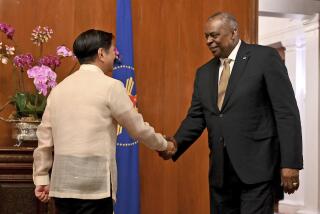U.S. Officials Hail Aquino Moves but See Reform Perils
- Share via
WASHINGTON — Despite the recent achievements of President Corazon Aquino, she faces a difficult task in reforming the Philippine government and economy, Pentagon and State Department officials said Monday.
The officials praised Aquino for dismissing several Cabinet members, for arranging a cease-fire with Communist insurgents and for negotiating new international loans, but they said that hard-core opponents will continue to trouble her government and that private investment by foreigners has lagged.
The officials, Gaston Sigur, assistant secretary of state for East Asian and Pacific affairs, and Karl D. Jackson, a deputy assistant secretary of defense, made their comments to the House Foreign Affairs subcommittee in connection with an effort by Chairman Stephen J. Solarz (D-N.Y.) to assess the outlook for what Aquino has said will be a fresh start.
Communists Castigated
The officials, both involved in East Asian policy, restated the U.S. commitment to the Aquino government. They castigated her Communist opponents and the policies of Ferdinand E. Marcos, Aquino’s predecessor, who was driven into exile in February.
Aquino has initiated policies aimed at “restoring market forces and private enterprise to their proper role as the engines of economic growth,” Sigur said. He said she inherited an economy that “was characterized by excessive government intervention and monopolies in key sectors.”
She also inherited a 17-year insurgency that has cost the lives of thousands of Filipinos. But last week, representatives of her government and Communist rebel leaders signed an agreement calling for a 60-day cease-fire beginning Dec. 10.
‘Forceful Leadership’
Jackson praised Aquino for her “forceful leadership” in hammering out the cease-fire. He said she “seized the political initiative and demonstrated . . . that she dominates the Philippine political stage.”
But neither Sigur nor Jackson was willing to bet that the cease-fire will end the conflict.
Sigur said the threat from the rebels “remains the most formidable challenge” facing the Aquino government. Jackson said that “even while negotiating a cease-fire, President Aquino . . . recognized the likelihood of eventually using force against hard-core elements” among the rebels.
Investors Hold Back
Private investors, uncertain about the duration of the cease-fire and the recent upheaval in the Aquino Cabinet, have held back on putting new money into the Philippines. But the European Communities and several nations, including Japan, Canada and Australia, have “substantially increased” economic assistance, Sigur said.
He noted that in the 1986 fiscal year, the United States provided $550 million in assistance to the Philippines, and he said it is providing an additional $200 million in fiscal 1987, which began Oct. 1.
Sigur said the U.S. government has set up a task force to help the Philippines find ways to expand trade. The group will meet in Manila this month, he said, adding that there are plans for a U.S.-Philippines council to strengthen business ties between the two countries.
More to Read
Sign up for Essential California
The most important California stories and recommendations in your inbox every morning.
You may occasionally receive promotional content from the Los Angeles Times.













